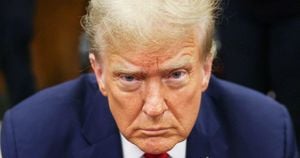Donald Trump’s potential second term as president is already creating waves within the economic policy arena. With his recent announcement of selecting Scott Bessent, a hedge fund manager and noted donor to his campaign, as his Treasury Secretary, there’s increasing speculation on how this appointment might influence tariff policies and overall economic strategies. Bessent not only brings immense financial experience but also serves as the first openly gay member of Trump’s cabinet, marking a historical moment for the administration. Speculations abound about his commitment to the Trump administration’s aggressive tariff agenda, which could weigh heavily on U.S. consumers, particularly low-income families and women.
Throughout his first term, Trump’s administration was known for its combative stance on international trade, particularly concerning China. His stated goal was to reduce America’s dependence on foreign goods by increasing tariffs, which are taxes on imports traded with foreign countries. Bessent’s role will likely focus on driving this policy forward, as Trump seeks to raise tariffs significantly—between 10% to 20% on all imports and even steeper increases of up to 60% on goods from China.
Historically, Trump’s approach to tariffs, such as the 25% increases on steel and 10% on aluminum imports during his first term, sparked mixed reactions. While some sectors experienced short-term benefits—like increased domestic production of steel—the overall impact was not universally positive. For example, manufacturers relying on these materials saw substantial decreases in production, highlighting the unforeseen consequences of hefty tariffs.
Echoing these sentiments, economists raised alarms about potential repercussions from Bessent’s policies. Some experts worry about triggering retaliatory tariffs from other countries, resulting in higher prices for goods across the board. A ripple effect from these high tariffs could hit low-income households the hardest; these families often rely on lower-cost imports, especially from Asian markets. If prices on imported goods rise due to imposed tariffs, many families may find themselves squeezed. Reports show women, particularly single mothers, make up the majority of low-wage workers who could feel the brunt of the economic strain.
According to findings from the World Trade Organization, the sectors most vulnerable to tariffs are also those with significant female employment. Fields like retail and manufacturing frequently depend on importing raw materials, putting women—who dominate the workforce in these areas—at greater risk if companies react by lowering wages or reducing hires to manage increased costs. For women leading households, this situation can have dire financial consequences, particularly highlighted by studies showing they are disproportionately responsible for family budgets.
Warnings from major Wall Street firms only add to the growing concerns. Analysts from Morgan Stanley and Goldman Sachs predict significant price rises resulting from Trump’s proposed tariff increases. The Oxford Economics group estimates the impact of such policies could hit the average American household with additional expenses of upwards of $2,600 annually if significant tariffs are enacted. The National Retail Federation emphasized the repercussions of these economic strategies, describing tariffs as akin to taxes for American families, anticipating the surging inflation rates compounded by higher prices on consumer goods.
Specific categories like electronics, clothing, and toys—which often see substantial importation from Asia—are likely to face notable price hikes. Retail giants such as Walmart have openly stated they anticipate having to increase prices, significantly deviated from their long-held commitment to low prices. John David Rainey, Walmart’s chief financial officer, acknowledged this uncertainty, admitting, “Our model is everyday low prices. But there probably will be cases where prices will go up for consumers.”
Conversation surrounding the future of stimulus checks is another integral aspect tied to Trump’s economic resurgence. During his previous presidency, Trump did sign off on two rounds of direct payments to Americans as emergency measures due to the COVID-19 pandemic. The economic environment surrounding those payments was vastly different, with widespread unemployment and pressing economic stagnation forcing the government’s hand. Current indicators, contrastingly, show the stock market recovering and unemployment dipping to relatively low levels. This change has erased the urgency for another stimulus round, influencing political perspectives.
Current gatherings of economic experts, like those organized by the London Business School, deliberated on the wider global ramifications of Trump’s policies with emphasis on how they could adversely affect both American families and international trade partners alike. Countries like Malaysia, Thailand, and Vietnam, which have relied upon the U.S. market amid prior trade disruptions, are now on alert. The return of the trademark “tariff tantrums” could precipitate investor retreat and weakening exports from these Southeast Asian nations just as they began recovering.
Total uncertainty looms over how all these economic maneuvers will play out, and the 2024 race for the presidency is shaping up to be more than just electoral politics; it’s about figuring out the financial future of many American families. The election's outcomes may also reflect changing economic tides amid rising concerns about inflation and the impacts of tariff policies over time. With the potential for sweeping changes to the structure of tariffs, and the economic groundwork built by Biden, the nation remains poised at the edge of significant economic shifts as Trump's policies may alter the financial landscapes both domestically and worldwide.
The anticipated policies provoke pressing questions about consumer resilience, particularly among vulnerable populations. If the administration embraces increased tariffs and pushes for protectionist measures, the repercussions could be far-reaching, hinting at both economic challenges and changes as households adapt reassessing their spending habits once more. How the economy balances these uncertain factors will determine the true outcome of Trump’s anticipated second term, especially concerning everyday Americans shaken by past policies.



